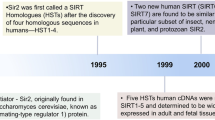Abstract.
Sirtuins comprise a unique class of nicotinamide adenine dinucleotide (NAD+)-dependent deacetylases that target multiple protein substrates to execute diverse biological functions. These enzymes are key regulators of clinically important cellular and organismal processes, including metabolism, cell division and aging. The desire to understand the important determinants of human health and lifespan has resulted in a firestorm of work on the seven mammalian sirtuins in less than a decade. The implication of sirtuins in medically important areas such as diabetes, cancer, cardiovascular dysfunction and neurodegenerative disease has further catapulted them to a prominent status as potential targets for nutritional and therapeutic development. Here, we present a review of published results on sirtuin biology and its relevance to human disease.
Similar content being viewed by others
Author information
Authors and Affiliations
Corresponding author
Additional information
Received 25 June 2008; received after revision 20 August 2008; accepted 29 August 2008
Rights and permissions
About this article
Cite this article
Taylor, D.M., Maxwell, M.M., Luthi-Carter, R. et al. Biological and Potential Therapeutic Roles of Sirtuin Deacetylases. Cell. Mol. Life Sci. 65, 4000 (2008). https://doi.org/10.1007/s00018-008-8357-y
Published:
DOI: https://doi.org/10.1007/s00018-008-8357-y




